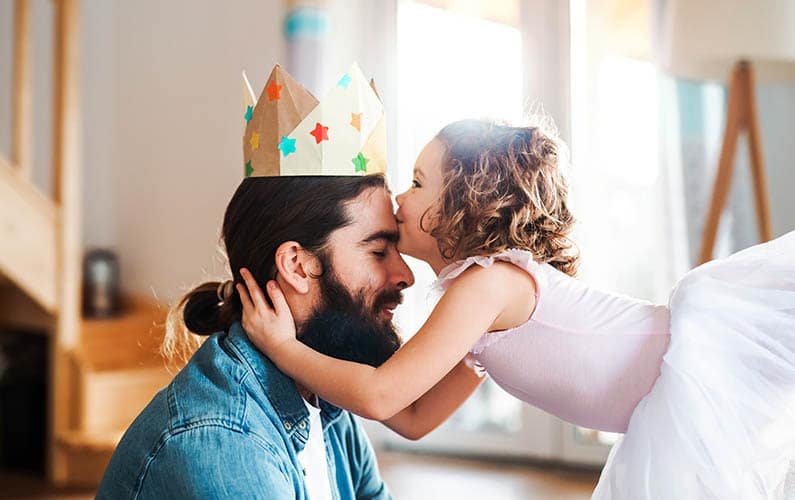Discipline or Inspiration?
It seems to be such a common discussion topic among parents: discipline. What’s healthy and necessary? What’s going too far? In our house, we try to actively prevent the need for discipline—a reactive parent action. Rather than focusing on correcting inappropriate behavior we ask, “How can we inspire great behavior?”
Being proactive is way easier.
Create your family culture
One of the most important things we do as parents is create the culture of our family. We hear a lot about this idea in relation to large companies (e.g., diverse, idealistic, progressive), but we create culture within our family with our words and actions too.
Does your family culture support whining, crying, and complaining at will? Or do you support open conversation, questions, good habits, and personal responsibility?
Every time a child’s will is thrust upon the family, it’s a simultaneous challenge and opportunity. We’ve all witnessed the rough patches—seen the poor parent dealing with their child’s major meltdown in public. (And it’s likely you’ve also had the joyous opportunity of being that parent too.)
No matter what we do sometimes, children are going to assert their will and/or meltdown. The question is, will you make the most of that teaching moment or will you ignore it without further conversation?
The child’s will is a very powerful force within a family dynamic. Either you figure out the best way to foster good behavior in your kids or it becomes a worse issue that has to be managed later.
And the unlearning of bad habits is significantly more challenging than taking the time to figure how best to inspire great behavior in your child when they are super young.
Issues will get worse over time if you choose to ignore them. Gentle and consistent redirection, even in your still developing and wildly emotional toddler, will prove immensely beneficial over time.
The approaches I’ve found to be most helpful in guiding my daughter along her path have centered around patiently hearing her out (no matter how absurd the conversation becomes), setting up a plan to address her ideas that works for both of us, and holding her to the agreements we make together, no matter how long it takes.
Start the process early
This all started for me when my daughter was 10 months old, and she wanted to make a mess as we played together. So we did! We made a big mess.
As a general rule for me, if a kid is able to come up with an idea and execute that idea, then that’s the time that they are also ready to learn about the responsibilities that go along with a chosen path of behavior.
So, when the mess was fully everywhere and my daughter was done playing, I asserted for the first time that we had to clean it up together.
That’s when I first bore witness to her little brain working overtime to come up with every possible option to do something other than clean up.
In her cutest baby-talk voice she could muster, she asked to go to the bathroom, get something to eat, go outside, etc. To all of those ideas I said, “Those are great ideas, and we can do them all after we clean up the mess we made.”
This back and forth went on for 45 minutes. There were some tears—hers poured out and I choked on mine.
In the moment it felt like a long time, but it was the beginning of a multi-year cultural-development project I affectionately called “cleaning up your s#@t in the house!”
This first discussion, with her at 10 months old, set the tone for the many, many, many practice sessions we’d have in the following years.
They have always been kind, respectful, and a little bit humorous, but they have led my daughter to be able to handle responsibility pretty successfully on her own.
Health, safety, and respect
This same idea of being responsible for her things would later evolve into fuller discussions about health, safety, and respect. Those three broad topics would turn out to be the headers of every serious conversation we’ve ever had.
When it came to every other creative idea, I was fine with whatever my daughter wanted to entertain—hunting for rainbows under the couch, trying to manifest a sparkling unicorn from the kitchen, etc. Whatever the hell it was, we tried to make it happen.
But when behaviors crossed over into problematic territories that had to do with health, safety, and respect (her own or that of those around her), my kid knew there were firmer lines that included the dreaded and much-maligned parenting term “no.”
She ultimately grew to understand that the outcome of these conversations would keep her healthy and safe, taught her how to think carefully about any given action or situation, and she now acknowledges her great opportunities because kids and other adults like being around her.
Does that mean we never have issues? No. But it does mean that instead of having to focus on figuring out how to stop inappropriate behavior, we have consistent language to call on for a quick reminder that then inspires more appropriate behavior.
That, in turn, leaves us more time to spend together figuring out our next adventure and the next mess we’ll clean up together.
What To Do Next
1. Read more in the blog:
The Family Wisdom Blog shares valuable ideas across diverse topics.
2. Explore the Printables Library:
Our printables library is filled with must-have activity ideas, checklists, guides, and workbooks.
3. Subscribe to Our Newsletter:
Sign up for our newsletter for parenting tips to help you create the family team you've always wanted.



